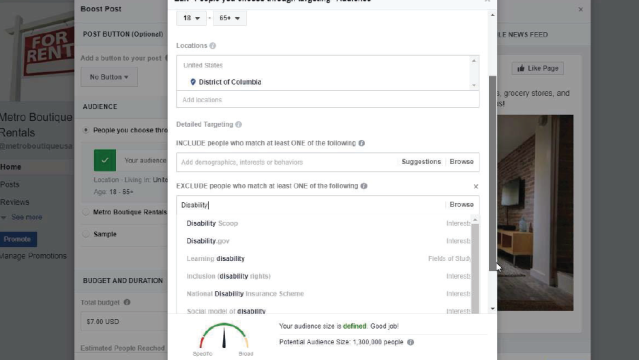A coalition of civil rights groups filed suit against Facebook yesterday, alleging the already harried company violated the US Fair Housing Act by allowing housing advertisers to discriminate against minority users. The National Fair Housing Alliance, Fair Housing Justice Center, Housing Opportunities Project for Excellence, and the Fair Housing Council of Greater San Antonio filed a joint suit asking a judge to declare Facebook’s policies as discriminatory and require the company to change its advertising policies to prevent discrimination.
A screenshot from Facebook’s ad portal. Photo: NFHA/Facebook
Central to the lawsuit is how Facebook synthesises the behavioural data it collects from users. In 2016, a Pro Publica report found that Facebook allowed housing advertisers to target, and exclude, categories of users based on their interests. Advertisers could create housing ads, then choose to include or exclude the ad from being shown to users who had indicated certain interests. The first part of the suit alleges that these interests acted as proxies for minorities, violating the Fair Housing Act.
So, while it’s illegal for a real estate agent to refuse to show a house to a disabled person, an agent could create an ad on Facebook for an apartment, and then choose to exclude all users who indicated an interest in “disability parking” or “Disability.gov”. The complaint argues there are several such proxy exclusions that permitted advertisers to discriminate against protected classes. Housing agents can’t discriminate against people based on their race or national origin, but Facebook allows advertisers to exclude against users with an Interest in “Telemundo” or “English as a Second Language”.
“[Facebook has] really been on notice about these issues for… almost two years now and have sort of made little tweaks around the edges due to public shaming, but have not really done a comprehensive effort to address the problem,” David Berman, one of the lawyers for the civil rights firm representing the group, told Gizmodo. “There’s no lawful reason why housing advertisers could exclude an audience from seeing its ad on the basis of interest in a disabled parking permit, or an interest in disabled American veterans.”
The suit filed yesterday covers both proxy exclusions as well as more direct exclusions. After a November 2017 follow up from Pro Publica found Facebook still permitted many of the contested advertising practices, the NFHA created fake ads to see if Facebook would accept them. It did. Among the categories Facebook allowed advertisers to exclude were “parents with toddlers” and “parents with preschoolers”. As the NFHA found, with a few clicks, advertisers could show ads to “men” with “no children” and exclude varying parent-based categories such as “soccer moms”, “parents with grade school kids”, and so on, creating housing ads that went out to single men to the exclusion of women with children.
The groups allege this violates both the Fair Housing Act and Facebook’s own internal policies on discriminatory housing ads. Facebook revised these rules in late-2016 after Pro Publica‘s first report and again in 2017 after the follow-up. The complaint alleges that not only has Facebook been lax in implementing the changes it promised in its apologies, but that Facebook may be using algorithms to secretly continue abetting illegal discrimination.
Just last week, when preparing the complaint, the NFHA tried to edit fake ads it’d created in 2016 to test the ad portal. According to NFHA, a pop-up appeared, saying: “some of the detailed targeting selections you originally used in your Saved Audience are no longer available. They won’t show up in this audience targeting, but the associated ads will still deliver to the original audience. However, you’ll be unable to use these detailed targeting selections if you edit this audience or try running future ads with it.” This could potentially mean the discrimination continues.
“We haven’t confirmed this to Facebook,” Berman says, “but what we would take that to mean is that while they prevented you from using race and national origin moving forward, people who discriminated in the past still are grandfathered in, so to speak. Those ads will keep running with race and national origin exclusions.”
Ultimately, the groups want Facebook to remove the selection categories that are tied to protected demographics, either by proxy (race, national origin, disability) or directly (gender, family status). The unanswered question of editing old ads brings new complications, as Facebook could potentially continue discriminatory practices even after removing the problematic categories from the ad portal.
“They have eliminated the checkbox, but I don’t think they have eliminated the algorithm,” Berman said.
A Facebook spokesperson reached out with comment: “There is absolutely no place for discrimination on Facebook. We believe this lawsuit is without merit, and we will defend ourselves vigorously.”
